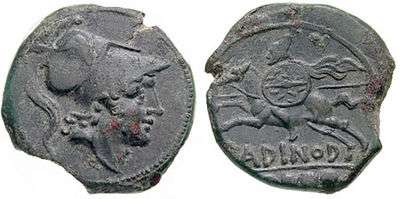Quincunx (Roman coin)
| A quincunx of Larinum | |
|---|---|
 | |
| Bearded head of Mars, wearing Corinthian helmet | [L]ADINOD, warrior on horseback galloping left; five pellets in exergue. |
| Circa 210–175 BC. Æ 22mm – 7.95 g. | |
The quincunx was an Ancient Roman bronze coin produced during the Roman Republic. The word quincunx comes from Latin quinque which means "five" and uncia which means "one twelfth", because the coin was valued at five-twelfths of an as (also called a libra). This value was sometimes symbolized by a pattern of five dots arranged like the points of a die, so this pattern also came to be called quincunx. It was only produced during the Second Punic War (218 to 204 BC). It was not part of the standard Roman monetary system and was produced by mints at Luceria (mod. Lucera), Teate (mod. Chieti), Larinum (mod. Larino), and northern Apulia.
A coin with the same value was minted in Capua, during the Second Punic War, after the defeat of Cannae.
External links
| Wikimedia Commons has media related to Quincunx. |
This article is issued from Wikipedia - version of the 5/23/2016. The text is available under the Creative Commons Attribution/Share Alike but additional terms may apply for the media files.